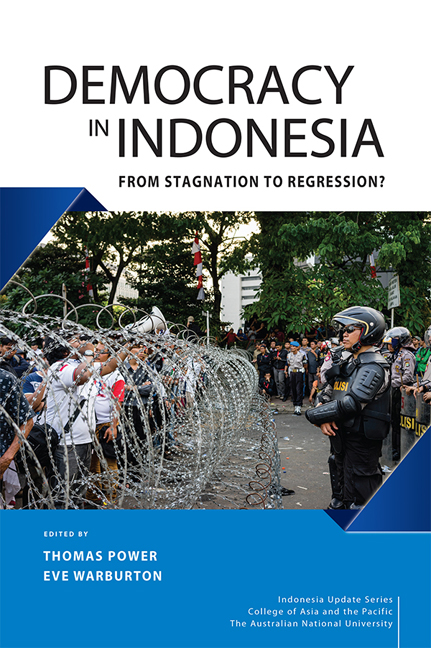Book contents
- Frontmatter
- Contents
- Tables and Figures
- Contributors
- Foreword
- Acknowledgments
- Glossary
- 1 The decline of Indonesian Democracy
- Part 1 Historic al and Comparative Perspectives
- Part 2 Polarisation and Populism
- Part 3 Popular Supp ort for Democracy
- Part 4 Democratic Institutions
- Part 5 Law, Security and Disorder
- Index
- Indonesia Update Series
9 - How popular conceptions of democracy shape democratic support in Indonesia
Published online by Cambridge University Press: 24 November 2020
- Frontmatter
- Contents
- Tables and Figures
- Contributors
- Foreword
- Acknowledgments
- Glossary
- 1 The decline of Indonesian Democracy
- Part 1 Historic al and Comparative Perspectives
- Part 2 Polarisation and Populism
- Part 3 Popular Supp ort for Democracy
- Part 4 Democratic Institutions
- Part 5 Law, Security and Disorder
- Index
- Indonesia Update Series
Summary
The path to democracy is rarely steady or linear. Countries can perform well on some indicators of democratic consolidation, while improvements in other areas remain elusive. Indonesia, for example, holds regular and competitive elections, but still confronts real challenges when it comes to protecting the rights of minorities. In other words, democracy is multidimensional. Democratic quality can be evaluated from different perspectives, and the conclusions analysts reach are often contingent on exactly what aspect of democratic consolidation they are analysing.
In this chapter, we focus on the multidimensionality of democracy. Specifically, we study how different dimensions of democracy are understood by Indonesian citizens. Public opinion research has painted a mixed picture of public support for democracy in Indonesia. On one hand, it shows that Indonesians are highly supportive of democracy. Although the results vary depending on how specific survey questions are formulated, scholars have shown that support for and satisfaction with democracy in Indonesia are generally high (Mietzner 2013; Mujani and Liddle 2015). On the other hand, some studies show that Indonesians do not understand democracy in liberal terms, as they equate democracy with good governance and policy outcomes rather than with a system of checks, balances and limited government (Aspinall et al. 2020; Warburton and Aspinall 2019). This is consistent with other cases in East and Southeast Asia (Chu and Huang 2010).
These findings point to the importance of investigating democracy as a concept, in a context where support for democracy is widespread but the meaning of ‘democracy’ is contested. Existing research, however, does not account for some of the important dimensions of democracy, such as deliberation and informal participation. Given Indonesia's long tradition of progressive politics (Dibley and Ford 2019) and relatively high levels of civic participation (Lussier and Fish 2012), this is a potentially important omission.
In this chapter, we draw on the comparative literature to describe and delimit five different dimensions for assessing democratic quality: electoral, liberal, deliberative, participatory and egalitarian. We then develop a new measure of how ordinary Indonesians conceive of democracy, which we use to address a series of research questions. First, we ask to what extent these five dimensions resonate in the minds of ordinary Indonesians as coherent and distinct ideological constructs.
- Type
- Chapter
- Information
- Democracy in IndonesiaFrom Stagnation to Regression?, pp. 166 - 188Publisher: ISEAS–Yusof Ishak InstitutePrint publication year: 2020

